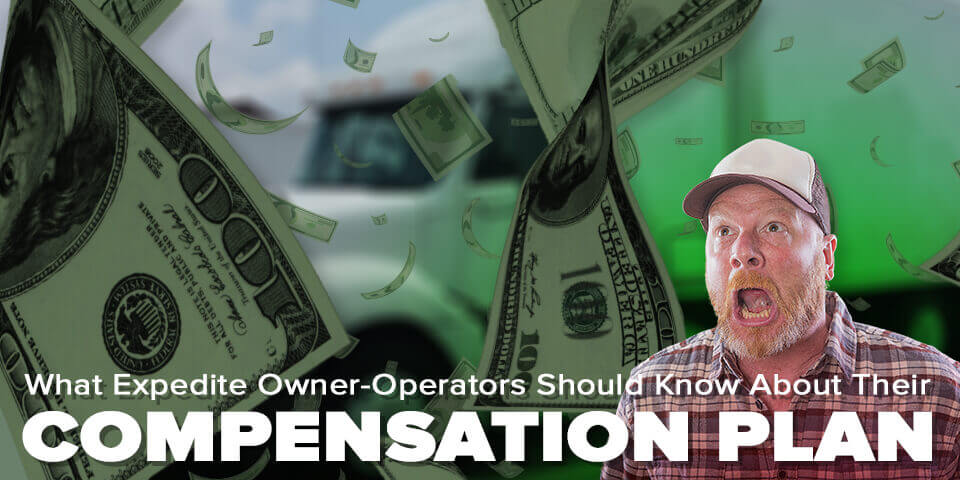Dollars & Sense

What Expedite Owner-Operators Should Know About Their Compensation Plan
The compensation plan you agree to with your carrier sets the "rules of the road" for how you will make money with your truck. But it also impacts how much money you get to keep. So, how do ensure you've covered all your bases so you know what to expect and aren't blindsided by unpleasant surprises?
Here are five factors to consider.
1. Mileage vs. Percentage
Does the carrier pay by flat rate per mile or percentage of revenue on each load?
If it's "percentage of revenue," find out what that percentage is based on, advises Dale Watkins, compliance agent, at Owner Operator Independent Drivers Association (OOIDA).
"The biggest complaint we get on the percentage compensation is when the carrier is taking a cut of the revenue before they are figuring a percentage for the owner-operator," says Watkins. "So, look closely at the contract. There are some contracts where owner-operator pay is something like 70 percent of 98 percent--not 70 percent of 100 percent. That means [the carrier] would already be taking two percent off the top, which lowers the 'total revenue' amount that the owner-operator would be paid off of. Be sure to go in with your eyes wide open."
With mileage pay, know what the pay rates are for the different types of miles.
"That is something that these guys have to figure out--if you have a contract that pays for 'all miles,' compared to a contract that only pays for 'loaded miles,'" says Watkins. "They have to sit down and do their homework. This is one thing I really caution guys about who call in about a contract."
Whichever types of plan you're being offered, run the numbers to compare the plans based on the specifics of your situation--to determine which route would be most advantageous to you.
2. Fuel surcharge
It can be a challenge to accurately figure out which companies offer the best rates because they all calculate fuel surcharge differently. Therefore, ask each carrier how they calculate their rates and whether they pay on all miles or only on loaded miles. If it's "all miles," find out what the difference is in fuel surcharge for loaded and unloaded miles.
(For more information, check out the Fuel Surcharge Calculator on the Owner-Operator Independent Drivers Association website at http://www.ooida.com/EducationTools/Tools/fuelsurcharge.asp.)
3. Payment Schedule
When can you expect to get paid? No matter what's included in a carrier's compensation plan, if you have to wait on your money longer than you expect, that delay in cash flow could sink your business before it gets started.
So, eliminate unpleasant surprises by knowing precisely when you should get paid and how the process works to ensure timely payment.
4. Upfront Expenses
Carriers typically collect escrow (as much as $1,000 or so) from drivers to cover insurance deductibles, satellite services, fuel taxes, and other items included in the lease agreement. Find out how much escrow is collected and what's included. Some carriers will offer drivers the option to make weekly payments to help reduce the upfront cash burden.
5. Administrative Charges
This is where the unpleasant surprises can really bite you, says Watkins.
"Any time there is a deduction in an owner-operator's pay, that charge must be spelled out in their contract," says Watkins. "I have come across some ridiculous deductions like $500 deduction per day if you don't call in by 10 o'clock in the morning. Those are things that you have to watch out for."
The Bottom Line
When it comes to your pay plan, ignorance is not bliss. So, if you have any questions, get an expert to review your plan to ensure it's fair and right for you. You can also reach out to OOIDA (http://www.ooida.com/), which reviews contracts as a free service to its members. This way, you can avoid the pitfalls and pave the road for building a profitable in business in expedited trucking.
